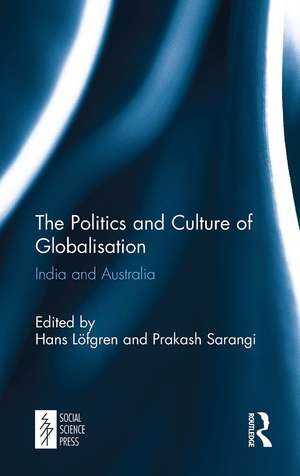The Politics and Culture of Globalisation: India and Australia
Editat de Hans Löfgren, Prakash Sarangien Limba Engleză Paperback – 25 iun 2024
| Toate formatele și edițiile | Preț | Express |
|---|---|---|
| Paperback (1) | 266.61 lei 6-8 săpt. | |
| Taylor & Francis – 25 iun 2024 | 266.61 lei 6-8 săpt. | |
| Hardback (1) | 1002.63 lei 6-8 săpt. | |
| Taylor & Francis – aug 2017 | 1002.63 lei 6-8 săpt. |
Preț: 266.61 lei
Preț vechi: 329.94 lei
-19% Nou
Puncte Express: 400
Preț estimativ în valută:
51.02€ • 53.40$ • 42.46£
51.02€ • 53.40$ • 42.46£
Carte tipărită la comandă
Livrare economică 01-15 aprilie
Preluare comenzi: 021 569.72.76
Specificații
ISBN-13: 9781032653051
ISBN-10: 1032653051
Pagini: 358
Dimensiuni: 138 x 216 mm
Greutate: 0.78 kg
Ediția:1
Editura: Taylor & Francis
Colecția Routledge
Locul publicării:Oxford, United Kingdom
ISBN-10: 1032653051
Pagini: 358
Dimensiuni: 138 x 216 mm
Greutate: 0.78 kg
Ediția:1
Editura: Taylor & Francis
Colecția Routledge
Locul publicării:Oxford, United Kingdom
Public țintă
PostgraduateCuprins
1. Introduction: Dynamics and Dilemmas of Globalisation – Hans Löfgren and Prakash Sarangi
Making sense of globalisation
2. Justice, Globalisation and Diverse Conceptual Worlds – Michael Leahy 3. Ontology of Permanence and Change: A Critique of Globalisation – A. Raghuramaraju 4. Neo-liberal Hyperglobalism in Australian Political Thought – Geoffrey Stokes 5. Hyperglobalisation’s Casualty: The Numerical Small – Purushottama Bilimoria
Governance and globalisation
6. Globalization and Indian Federalism: Re-assertion of States’ Rights – Harihar Bhattacharyya 7. Challenges of Globalisation in Urban Local Governance – Sudha Mohan 8. Understanding Community Governance and Rural Regeneration in a Globalised World – Kevin O’Toole 9. Chemicals and Pharmaceuticals in South India: ‘Sun-rise’ Industrialisation or Global Cost-shifting of Dirty Goods Manufacturing – G.Vijay 10.India’s Drug Multinationals: Growth Strategies and Global Industry Dynamics – Hans Löfgren
Experiencing globalisation
11. ‘The Good Australians’: Anglo-Indians, Multiculturalism and Cosmopolitanism – Glenn D’Cruz 12. Cosmopolitanism and Tolerance – Stan van Hooft 13. Late Marxism and Parliamentary Government: Indian Communism Today – Geoff Robinson
Globalisation, Foreign Relations and Security
14. Indo-Australian Relations in the Post-Cold War Period – Y. Yagama Reddy and Ken Boutin 15. Indo-Australian Relations: Beyond Indifference – Gary Smith 16. Terror, Power and Protest – Andrew Vandenberg 17. Globalisation, ‘Glocalisation’ and South Asian Insecurity – B. Ramesh Babu
Making sense of globalisation
2. Justice, Globalisation and Diverse Conceptual Worlds – Michael Leahy 3. Ontology of Permanence and Change: A Critique of Globalisation – A. Raghuramaraju 4. Neo-liberal Hyperglobalism in Australian Political Thought – Geoffrey Stokes 5. Hyperglobalisation’s Casualty: The Numerical Small – Purushottama Bilimoria
Governance and globalisation
6. Globalization and Indian Federalism: Re-assertion of States’ Rights – Harihar Bhattacharyya 7. Challenges of Globalisation in Urban Local Governance – Sudha Mohan 8. Understanding Community Governance and Rural Regeneration in a Globalised World – Kevin O’Toole 9. Chemicals and Pharmaceuticals in South India: ‘Sun-rise’ Industrialisation or Global Cost-shifting of Dirty Goods Manufacturing – G.Vijay 10.India’s Drug Multinationals: Growth Strategies and Global Industry Dynamics – Hans Löfgren
Experiencing globalisation
11. ‘The Good Australians’: Anglo-Indians, Multiculturalism and Cosmopolitanism – Glenn D’Cruz 12. Cosmopolitanism and Tolerance – Stan van Hooft 13. Late Marxism and Parliamentary Government: Indian Communism Today – Geoff Robinson
Globalisation, Foreign Relations and Security
14. Indo-Australian Relations in the Post-Cold War Period – Y. Yagama Reddy and Ken Boutin 15. Indo-Australian Relations: Beyond Indifference – Gary Smith 16. Terror, Power and Protest – Andrew Vandenberg 17. Globalisation, ‘Glocalisation’ and South Asian Insecurity – B. Ramesh Babu
Notă biografică
Hans Löfgren is Director of the Master of Politics and Policy Program at Deakin University, Australia. He has published extensively on the politics and economics of pharmaceuticals, for example in New Political Science (2007), Australia New Zealand Health Policy (2007) and Social Science & Medicine (2004).
Prakash Sarangi is Professor of Political Science at the University of Hyderabad. His publications include Liberal Theories of State: Contemporary Perspectives (1996) and Political Exchange and Public Policy: A Cross-National Analysis (1990).
Prakash Sarangi is Professor of Political Science at the University of Hyderabad. His publications include Liberal Theories of State: Contemporary Perspectives (1996) and Political Exchange and Public Policy: A Cross-National Analysis (1990).
Descriere
This volume explores Indian-Australian relations. It brings together Indian and Australian experts in the fields of political science, international relations, philosophy, cultural theory and political economy. The neo-liberal form of globalisation is a key focus of critique in this volume. It also examines the search for alternative forms of
